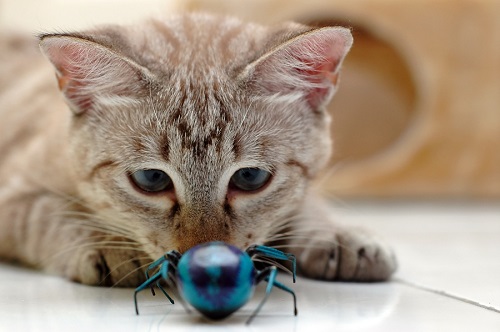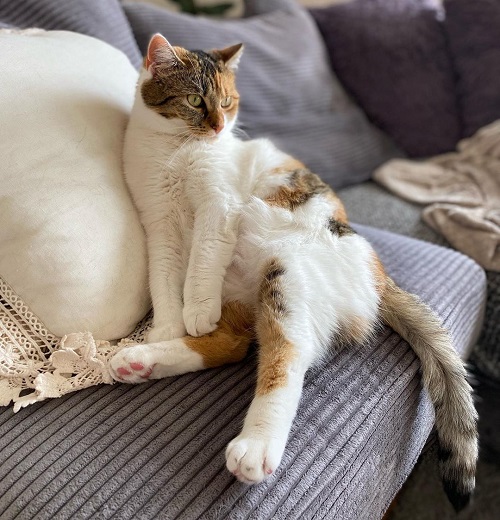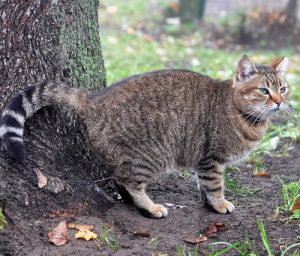Do Cats Kill Bugs? Learn more about your cat’s natural instincts and much more in this well-curated article.
Cats, with their razor-sharp claws and lightning-quick reflexes, are known for their hunting skills. But how do they react when faced with bugs? Do Cats Kill Bugs? Let’s find out below.
Do Cats Eat Ducklings? Find out here
The Natural Hunting Instincts Of Cats

Cats are renowned for their natural hunting instincts, which have been honed over centuries of evolution. These instincts are deeply ingrained in their DNA, originating from their ancestors who were skilled predators in the wild. Even though our domesticated feline friends live in cozy homes today, their instinctual drive to hunt remains intact. It is a behavior that can be observed in cats of all ages and breeds, ranging from small and playful kittens to mature and seasoned hunters.
Do Cats Kill Bugs?

Since they are natural hunters, do cats kill bugs in the house? Yes, they do! Felines have a keen ability to track and capture these small creatures. Their hunting instincts make them skilled predators when it comes to bugs. Cats possess excellent agility, sharp claws, and keen senses, which allow them to stalk and pounce on their tiny prey with precision.
Why Do Cats Kill Bugs?
- Mental Stimulation: Hunting bugs provides mental stimulation for felines. It engages their senses of sight, hearing, and smell, allowing them to stay mentally sharp and active.
- Exercise: Bug hunting serves as a form of physical exercise for kitties. It lets them expend energy, maintain agility, and keep their muscles toned.
- Prey Simulation: Hunting bugs gives cats the opportunity to engage in natural predatory behavior, simulating the chase and capture process they would experience in the wild.
- Play and Amusement: The act of chasing bugs can be entertaining and amusing for cats. It satisfies their natural curiosity and provides a form of interactive play.
Do note that not all cats exhibit the same level of interest or proficiency in bug hunting. Some felines show more enthusiasm and skill in pursuing bugs, while others may not be as motivated or may simply prefer different types of prey.
Benefits Of Cats Killing Bugs

The act of cats killing bugs can bring several benefits, both for the cats themselves and for their human companions. Some of the advantages include:
- Pest Control: Cats serve as natural pest controllers, helping to reduce the population of unwanted insects in and around the house. By eliminating bugs, they contribute to maintaining a more pest-free environment.
- Indoor Hygiene: Bugs such as flies, mosquitoes, and spiders can be bothersome and unsanitary. Cats’ bug-killing instincts help to keep these pests at bay, promoting a cleaner and more hygienic living space.
- Bonding Opportunity: Observing a cat’s bug-hunting prowess can be an enjoyable and entertaining experience for cat owners. It can create a bond and a sense of shared amusement between humans and their feline companions.
- Natural Behavior Expression: Allowing cats to engage in bug hunting allows them to express their natural predatory behavior. It gives them an outlet for their instincts and contributes to their overall well-being.
It is important to note that while there are benefits to cats killing bugs, it is essential to ensure the safety of both the cats and the environment. Monitoring the types of bugs they encounter, keeping them away from harmful or toxic insects, and maintaining appropriate pest control measures are crucial for a healthy and harmonious relationship between cats and bugs.
Types of Bugs Commonly Targeted By Cats
Cats target a wide range of bugs due to their natural hunting instincts. While individual choices may vary, here are some types of bugs that felines often find enticing:
- Flies: The buzzing and erratic movement of flies make them a prime target for cats. Flies are quick and agile, providing challenging prey for felines to chase and catch.
- Moths: The fluttering flight pattern of moths catches the attention of cats. Their erratic movement mimics that of a small bird or prey, triggering a cat’s hunting instincts.
- Spiders: Cats are often intrigued by the skittering movement of spiders. While some spiders may pose a threat to kitties, many common household spiders are harmless, making them fair game for hunting.
- Beetles: Beetles, with their hard exoskeleton and scurrying movement, can be enticing for cats.
- Ants: The organized trails and rapid movement of ants can attract cats’ attention. Kitties enjoy pawing at or even consuming ants that cross their path.
- Crickets: The chirping sound produced by crickets can be intriguing to felines. Their hopping and leaping movements make them an enticing target for a playful chase.
- Silverfish: Cats may be drawn to the quick darting movements of silverfish. These small insects can trigger a cat’s hunting instincts, leading to a pursuit.
- Cockroaches: Cockroaches are fast-moving insects that can trigger a cat’s predatory instincts. Cats may see them as worthy adversaries to chase and catch.
- Earwigs: The elongated bodies and pincer-like appendages of earwigs can attract a cat’s attention. Cats may engage in play or hunting behavior with these bugs.
- Grasshoppers: The leaping and flying abilities of grasshoppers make them an exciting target for kitties. Their unpredictable movements can engage a cat’s hunting instincts.
Do Cats Kill Bugs? Quick Takeaways
- Cats have natural hunting instincts that drive them to chase and capture bugs.
- Felines are skilled predators when it comes to bugs, using their agility, sharp claws, and keen senses.
- Kitty kills bugs for mental stimulation, exercise, prey simulation, and play.
- Bug hunting by cats contributes to pest control and promotes a cleaner indoor environment.
- Observing cats’ bug-hunting behavior can create a bonding opportunity between cats and their owners.
- Allowing kitties to hunt bugs allows them to express their natural predatory behavior and contributes to their well-being.
- Common bugs targeted by cats include flies, moths, spiders, beetles, ants, crickets, silverfish, cockroaches, earwigs, and grasshoppers.
- Individual cats may show varying levels of interest and proficiency in bug hunting.



